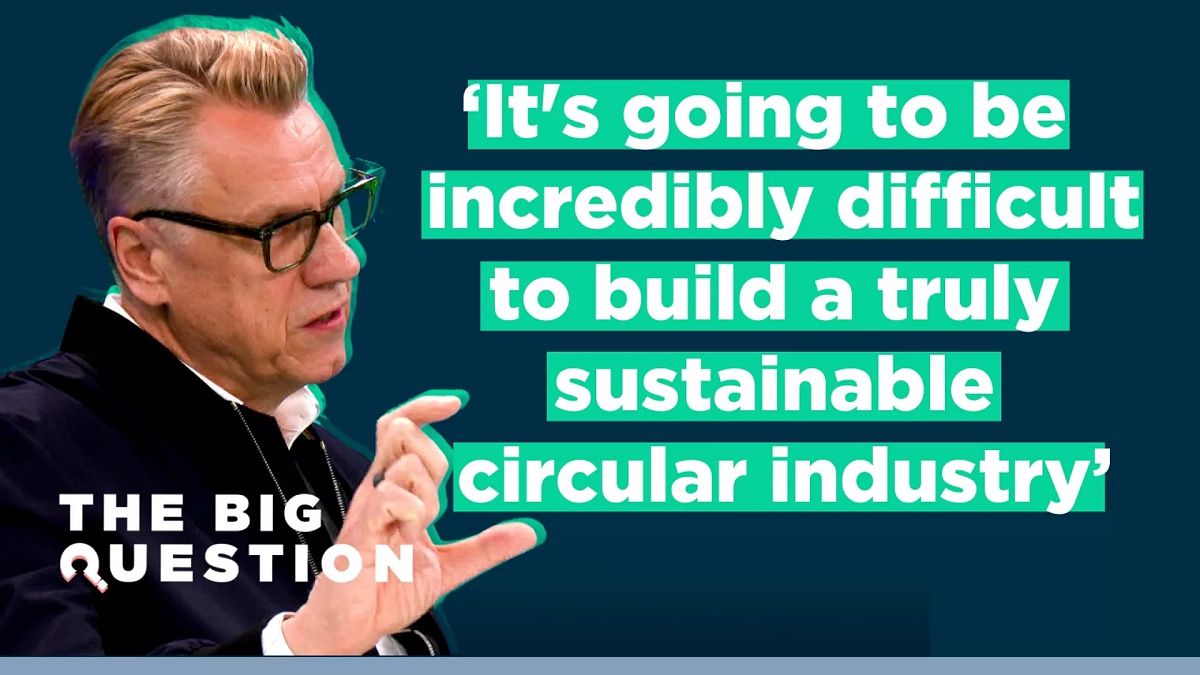Did you know that the EU was the world’s biggest importer of textiles and apparel in 2023, importing about €176.9 billion worth of apparel, according to the World Trade Organisation? France, Germany, Italy and Spain were some of the largest importers within the bloc.
Much of this is because of the surge in fast fashion seen in recent years, boosted by companies such as Temu and Shein, who offer products at extremely low prices.
According to Cascale, a global non-profit alliance bringing together brands, manufacturers and retailers, European consumers each buy about 42 pieces of apparel yearly and send approximately 12kg of textile product to landfills annually.
In this episode of The Big Question, Cascale’s CEO, Colin Browne, talks about how textile industry emissions can be slashed significantly and underlines the importance of a circular supply chain, which he says can be achieved without reducing profits.
Fashion industry emissions could be cut by 45% by 2030
Cascale estimated that the global textile industry emits one gigaton of CO2 annually. The textile and garment industry accounts for 6% to 8% of global carbon emissions, according to the US’ NationalInstitutes of Health.
“70% of the emissions from our industry come from the manufacturing of goods”, said Browne.
However, Browne argued that the textile industry’s emissions could be slashed significantly through collaboration.
“Having the industry work together to address climate change is where we feel that there’s a huge opportunity, and we feel that if we can bring the industry together, there is an opportunity to reduce greenhouse gases within our industry by 45% by 2030,” he said.
Creating and integrating a circular supply chain, which tries to slash wastage and re-use materials as much as possible, will be key to this.
“It’s going to have to be: plan, source, make, ship, sell, return, bring it back into the supply chain. That last quarter we’ve yet to really stand up. The industry and society itself needs to figure out: ‘How do we join that last part of the equation?’”
Cascale claims to fight climate change and increase social justice through its Industry Decarbonisation Roadmap. This is a plan to focus on supply chain emissions at scale, and decarbonise worldwide manufacturing through collaborative action and supply chain alignment.
However, Browne did not provide specifics on Cascale member names. Neither did he reveal which companies were leading the way, nor which were the most responsible for perpetuating fast fashion. Despite claims that it is a champion of social justice, Cascale also doesn’t count any unions among its members.
He highlighted that customers dictate what should be produced, often influenced by social media and their own social circles.
“You always want what the next person has,” he said.
As such, companies mainly follow these demand signals when deciding what and how much to produce.
Being more sustainable does not have to be more expensive
Browne argued that companies don’t necessarily have to spend more to be more sustainable, pointing out that industries will be more likely to take positive action if they see a way to combine sustainability and profitability.
“If people can make money out of it, it will be done a lot quicker. It’s a question of choosing the right materials and thinking through how you specify products and how you build products in a responsible way,” Browne said.
He also emphasised that Europe often leads the way with sustainability regulation, referring to “landmark pieces of legislation” from the EU, which set benchmarks to hold businesses accountable.
However, concerns remain that regulations which set out requirements for sustainability reporting will be watered down.
Browne warned “that would be a huge mistake”, adding that Cascale is “really concerned” because it feels Europe has “an opportunity to lead” on this front.
The Big Questionis a series from Euronews Business where we sit down with industry leaders and experts to discuss some of the most important topics on today’s agenda.
Watch the video above to see the full discussion with Cascale CEO, Colin Browne.

